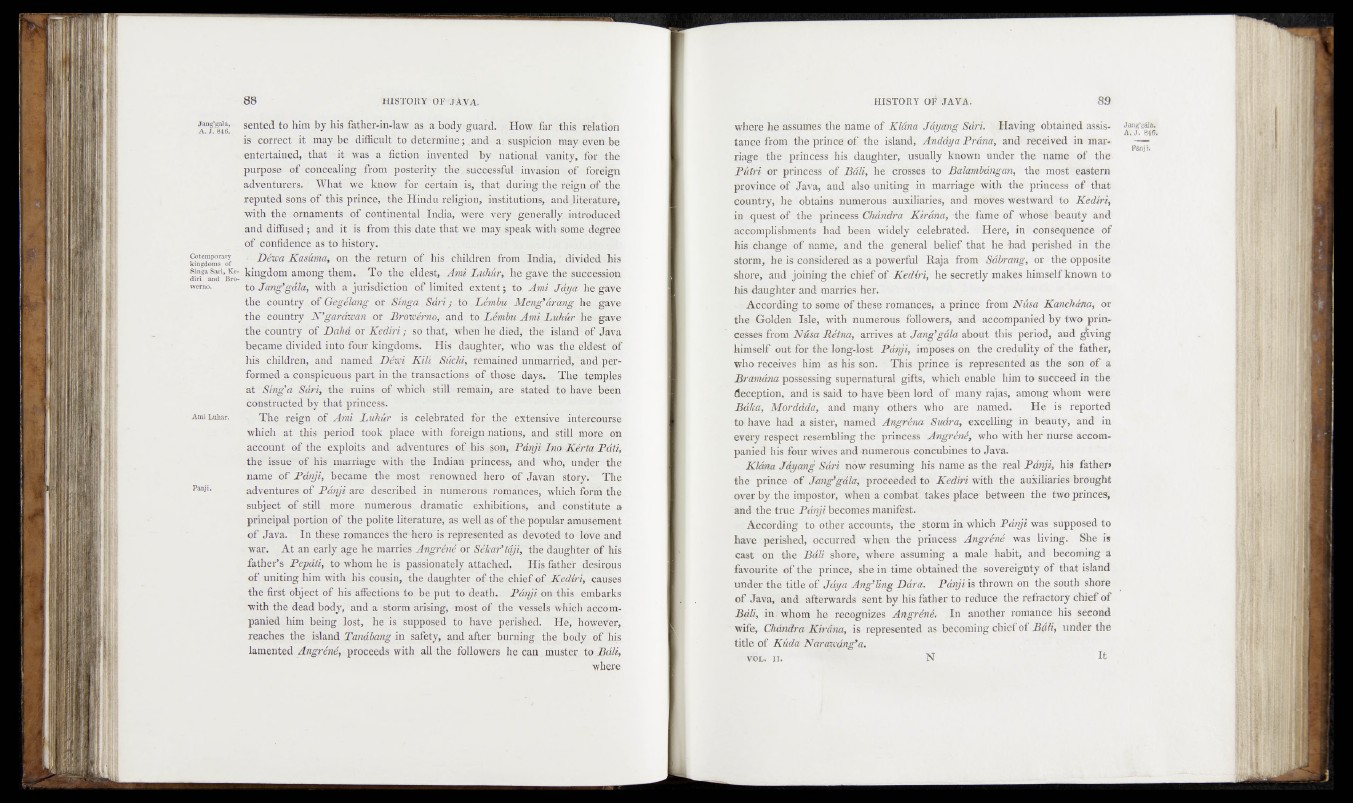
Jaug*gaJa,
A.J. 846.
Cotemporary
kingdoms of
Singa Sari, Ke-
dâ# and 3f®a£
Wernö.
Ami Luliar.
Panji.
seated to him by his father-indaw. as a.bodyiguard. How, far thiâ ffelation
incorrect it may be' difficult to determine ;„andwa; tospicion, mapipMiibh
entertained, - that t it ■ was a fiction^ invented < "by national • vanity, ffor lithe
purpose- of ^concealing ;jfrom posterity, the-, successful- invasion of (foreign
adventurers. Whati/we know for‘.certain is, that during 'the 5?eign>of the
reputed sons of this prince, the. Hindu religion, institutions, and;literature,
with the .ornaments of continental India, were .very generally..introduced
and diffused ; and it is .from this date that we may speak withr some - degree
of ; confidence- as'lö history.
>' Detect Kaséma, ; on the return of, his childrenfrom .India;.; diwdeduhis
kingdom among them. To the eldest,. Ami Luhûr,. he'gayeifihe iSueb&sion
to Jangjgdla, with a jurisdiction of limited extent;" to Ami Jay a hé'gave
the country of Gegêlang. or Singa. Sdri ; to±Lénbut Meng’drang he gave
tlie - country N ’gardman or Browémor and to Lémbu Ami:Luhér'-he^g«ve
the country of Dahd or Kediri ; so that, wheii hé dîëd;bhé* island'
became divided into four kingdoms.
his children, and named. Déwi Kill Suchi, remained unmarried, -and (performed
a conspicuous part in the. transactions :of -those, days.,, The,^-temples
at Sing'a Séri-, the ruins of which--still-remain,, are stated 'tofoavëfoeen
constructed by that'princess. ' '
The reign of Ami JÀihér is celebrated for' 1he ,'Cxtehsii^ l ï|iieï^Mrse'
which at this period took places-with jfqrejgi^natipns, .and still more on
account of the exploits and adventures „ofehis^gon, Pdnji Ino KerMPdti,
the issue' of his marriage with the Indian princess, JÉad whojmnder the
name of Pdnji, became the most renowned■ frero' of JàVâh story.'' -The
adventures of Pdnji are described in numerous romances^' which form the
subject of ,still more numerous, dramatic exhibitions, and ’constitute a
principal portion of the polite literature, as weff as of the popular amusement
óf Java. In these romances'thd'-hero* is represented as devoted to-JoVe and
war. A t an early age he marries Angréné ör SékaPtqji, the tfaugKtef of his
father’s Pegdti, to whom he is passionately attached. His father desirous
of uniting him with, bis cousin, the daughter of the .chief qf Kediri, causes
the first object of his affections to be put to death.. Pdnji onrthis embarks
with the dead bódy, and a storm arising, »most of thé-vessels which accompanied
him being lost, he ‘is supposed to ' hâve perished. He, howeVter,
reaches the island Tandbang in safety, and after burning, the body of his
lamented Angrénél j proceeds with all the. followers he can muster to Bdli,
where
where he assumes the name of Klam J&ydng Sdri. Having obtained assistance
from the prince o f1 the. island, AnddyaPrdma, and received in marriage
j i ip . princess his. daugfater, .usually known under the name of the
Pétri or princess o£-Bdli, he crosses to Balambdngan, the inns# eastern
province of Java, and’ also uniting in marriage»-with the princess of that
country, he obtains numerous auxiliaries; and moves westward' to Kediri,
in quest of; the prineess Chdndra Kirdna, the. fame of whosp'beauty and
‘^pöïnplishments had bqén ^widely celebrated. Here, fin consequence of
his change of name, and the general belief that he had perished in the
storm, be. is considered as a powerful Baja from Sabrang, or the opposite
shore, and joining the chief of- Kediri, he secretly makes himself known to
his daughter and marries her.
• According to some of these romances, a prince from Nósa Kanchéna, or
the Golden Isle, with numerous followers, and accompanied by two prirv
cesses from Nûsa JRétna, arrives at Jmg’gdla about this period, and giving
himself out for the long-lost Pdnji, imposes on the credulity of the father,
who receives him as his son. This prince is represented as the son of a
Bramdna possessing supernatural gifts, which enable him to succeed in the
deception, and is said to have hóen lord of many rajas, among whom were
Bdka, Morddda, and many others who are named. Hq is reported
to have had a sister, named Angréna Sudra, excelling in beauty, and in
every respect resembling the princess Angréné, who with her nurse accompanied
his four wives and -numerous concubines to Java.
Klana Jdyang Sdri now resuming his name as the real Pdnji, his father»
the prince of Jang*gdla, proceeded to Kediri with the auxiliaries brought
over by the impostor, when a combat' takes place' between the two princes,
tod the true Pdnji becomes manifest.
According to- other accounts* the storm, in,- which Pdnji was supposed to
have perished, occurred when die princess Angréné was living. She is
cast on the Bdli shore, where assuming a male habit, and becoming A
favourite of the prince, she in time obtained the sovereignty of that island
under the title of Jdya Ang’ling Ddra. Pdnji is thrown on the south shore
of Java, and afterwards sent by his father to reduce the refractory chief of
BdU, in, whom he recognizes Angréné* In another romance Ms second
wife, Chdndra Kirdna, is represented as becoming chief of Bdli, under the
title of Kûda Narawàng’a.
VOL. II. N It